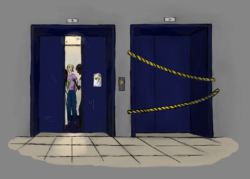You wake up one morning to find your throat as raspy as Bob Dylan’s. You trudge to class, yet you can’t help but cough at the least opportune moments and, despite your best attempts, you are that loathsome person whose nose just won’t stop running. But it’s not a cold. It can’t be. Georgetown students can’t afford to get sick. We have classes, commitments, jobs, and social lives. Maybe it’s nerdy, but in general, the only thing that we Hoyas hate more than the flu itself is missing a day of school. With daunting mountains of make-up work in mind, you decide that the 101 on the thermometer must be a mistake, and schlep out into the cold. Better to be on top of your schedule, especially since your only alternative is staying cooped up in your room.
Being sick on campus is a hassle. Everything from hiking up to the Health Center—where you find that your only option is to book an appointment for the following week—going to CVS to buy Robitussin, rummaging through Vittles and Snaxa for some chicken soup, all while focusing on not slipping on black ice, prove considerable challenges. And it’s a lonely hassle, as friends are preoccupied with their own commitments and can only devote so much of their day to being your surrogate mom.
College students already don’t take very good care of themselves, with all the partying, late nights, and junk food. Getting sick seems to be inevitable, and it would be nice to have a welcoming room or center—preferably one with comfy couches, fuzzy blankets, and mom’s chicken noodle soup—already at hand? Unfortunately, this haven doesn’t exist, and we are left to rely on friends to take care of us with canned soup and Leo’s bagels.
It’s hard to know when feeling sick warrants a day of bed rest, though, and given the drawbacks of taking a day off, many of us do our best to shrug off our symptoms and tough it out. But, it can be dangerous to ignore your body. This year alone I have gone to the hospital twice to help two different friends. Both had nasal infections and the flu, but because they didn’t have fevers, they denied that they needed any treatment or time off. One friend almost fainted in class; the other called GERMS at 6 a.m. because she couldn’t walk up to the Health Center. Denial was not the solution for these two girls, and in the end both wound up confined to their beds for four days anyway.
One of the most unpleasant aspects of being sick at Georgetown is that there is nowhere go. Everyone from our professors to the writers of the Stall Seat Journal tell us that when we have the flu we have to stay in our dorms. But how are you supposed to feel better when you’re stuck in a tiny dorm room, constantly being awakened by your roommate, breathing the same stale air all day? Our campus is sorely lacking in community space for its undergrads, and that includes quiet areas to be sick where you don’t have to disgust your roommate with your coughs.
Unfortunately, feeling a little under the weather often means enduring the seemingly endless wait to see a doctor at the Health Center. Most of the time students know their illness and know what medication they need, but are unable to obtain it without a prescription. Overall the experience is frustrating and results in more lost sleep thanks to long stretches in the overcrowded, microbe-stocked waiting room. Couldn’t there be another center that deals with minor colds or sicknesses? A sort of express line for the sick, preferably more accessible and centrally located. Students could more easily access doctors and be on their way again, instead of denying that they feel awful until they experience a full-fledged health breakdown.
In the winter, students are bound to get sick. Especially during finals, with stress levels high and immune systems on the verge of shutting down, campus feels like a giant bubble of germs. Everywhere you turn you hear people hacking and complaining about not feeling well.
The best we can do is be proactive: sleep, eat well, exercise, and wash our hands. But even that is not enough to combat the exposure to germs that comes with dorm life. Our bodies are bound to break down occasionally, and Georgetown should offer some sort of respite so that we can build ourselves back up. Being sick is never fun, and without the right resources, the road to recovery can be unnecessarily and uncomfortably drawn out.




